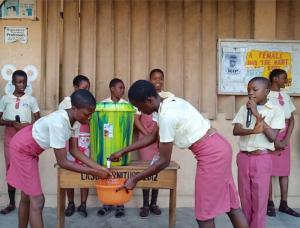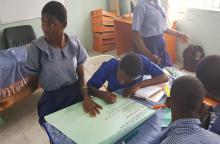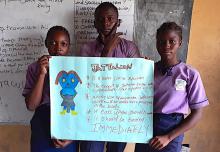Empowering students to become powerful change agents against antimicrobial resistance in Nigeria
Abuja, 5 July, 2019 – With financial support of Global Affairs Canada, and in partnership with the Dr Ameyo Stella Adadevoh Health Trust (DRASA) , the World Health Organization (WHO) is empowering students to become effective agents on antimicrobial resistance and health hygiene.
“I didn’t know that antibiotics are for bacteria. If I am sick, we usually do self-medication. My mummy gives us drugs. We just go to the chemist and buy drugs. But you taught us more about antibiotics and that it is not for all diseases or sickness. Now I know that if we’re using antibiotics for the wrong disease we are endangering ourselves,” said Naomi from Lagos Progressive Senior High school in Lagos State.
Naomi Adenira is one of the 320 students’ ambassadors trained by DRASA with the support of WHO and Canada to become drivers of good health, hygiene and antibiotic practices. Relying on a network of Health and Hygiene Clubs in 10 schools across Lagos State, this training aims at empowering young people in playing a major role against the rising threat of antimicrobial resistance and the promotion of good hygiene.
Antimicrobial resistance is the ability of a microbe to become resistant to drugs that once were successful in treating the infection they cause. It is today one of the major health concerns worldwide. While resistance occurs naturally over time, the misuse and overuse of those drugs is accelerating it. This is of concern in Nigeria where drugs are needed to treat communicable diseases that still represent the major causes of morbidity and mortality. While 150,000 children under 5 die every year in Nigeria due to diarrhoea, the misuse and abuse of antibiotics have led strains of bacteria that cause diarrhoea to become more resistant to the drugs available.
Educating people to better use those drugs and adhere to good hygiene practices is crucial to prevent the spread of such diseases and ensuring that drugs remain effective to treat patients.
“Encouraging people to change their behaviours however require an approach to communication, education and awareness that goes beyond just educating or giving information. It is about engaging and empowering populations as well as changing perceptions to inspire new or different behaviours. School children play a critical role in changing these behaviours” said Niniola Soleye from DRASA.
Schools are a major source of exposure to infections due to close contacts between students. School hygiene campaigns can reduce rates of infection in children, staff and their families. Children can also help spreading knowledge and information on good practices within their families and communities contributing in behaviour change.
To better educate school children on good health and hygiene practices and reduce antimicrobial resistance, DRASA established in September 2018 Health and Hygiene Clubs in eight public government secondary schools and two private secondary schools in Lagos State. Through these clubs, 320 Ambassadors were trained on handwashing and personal hygiene practices, knowledge of antibiotics, proper use of and disposal of antibiotics and proper food safety.
Evaluation conducted after the completion of their training showed important improvement in the Ambassadors’ knowledge of antibiotics and antibiotic resistance. At the beginning of the programme, only 34.1% of the Ambassadors were aware that antibiotics only kill bacteria and not viruses. By the end of the training, this increased to 80% of the Ambassadors. Similar progress were noted regarding the need to fully complete treatments even if feeling better (from 39% to 74%), the need to get tested before taking malaria drugs (from 67% to 89%) and in handwashing behaviour (from 56% of Ambassadors always using soap to wash hands to 72%).
As their understanding improved, those Ambassadors effectively contributed in sharing their new knowledge with family members and communities. “I saw a girl, she was playing. So when she finished her mother called her to come and eat. Instead of her to wash her hands before eating, she ate right away. Then I warned her that next time, before anything she is supposed to wash her hands with soap and water” said one of the Ambassadors. Another reported that during Christmas carol at church, she was given 10 minutes to teach church members the proper handwashing technique.
“Those results are very promising” said Dr Peter Clement, Officer in Charge for WHO Nigeria. “Children are our future generation of drug users. Educating them now about good hygiene practices and proper use of drugs will have an important impact in the years to come. But they can also help improving the situation today by sharing their knowledge with their parents and communities. They are true Ambassadors in our efforts to improve the health and well-being of all Nigerians. I am very grateful to DRASA for this initiative and to Canada for their support”.
WHO country office is providing support for the implementation of the National Action Plan for antimicrobial resistance through a one health approach with the leadership of the Nigeria Centre for Disease Control.





